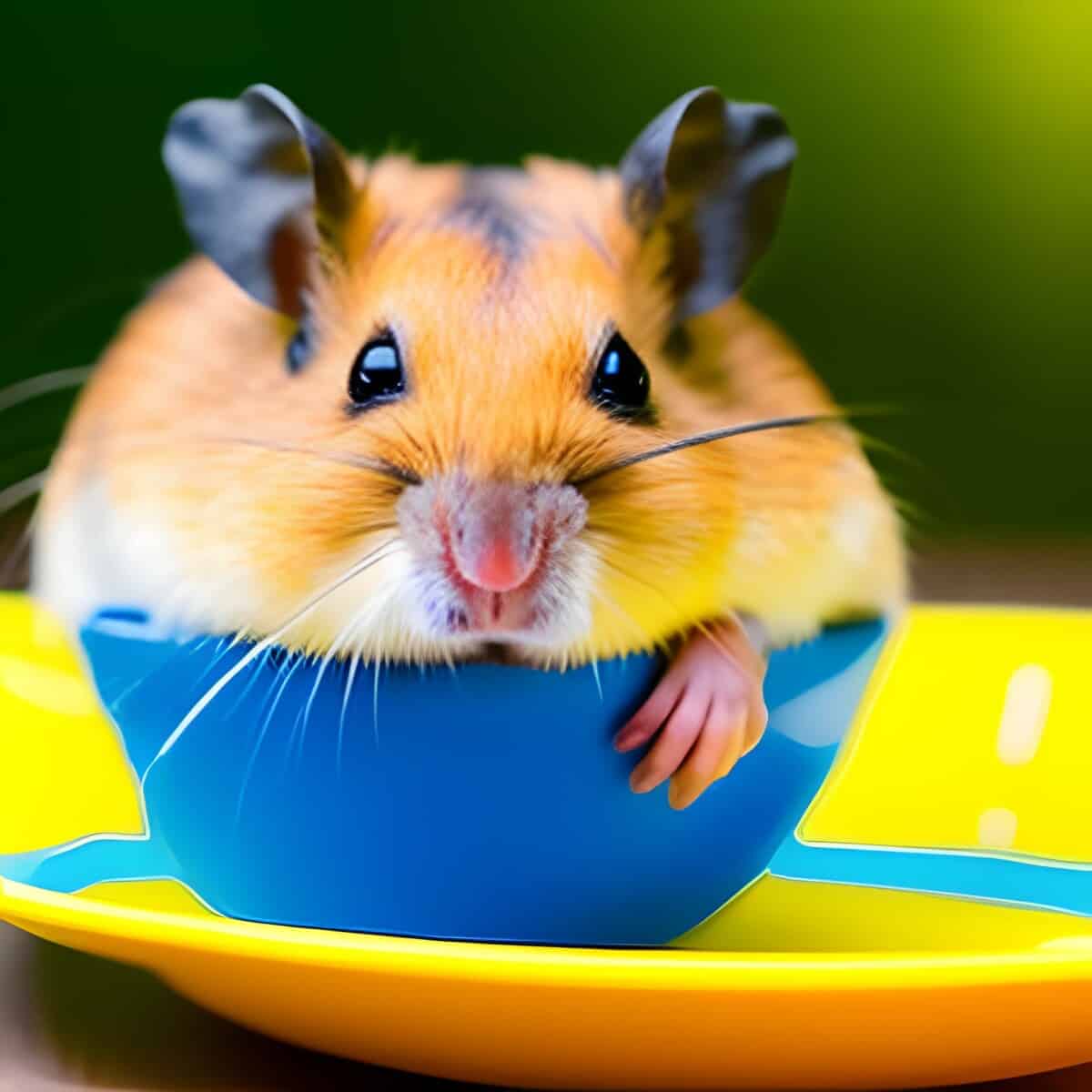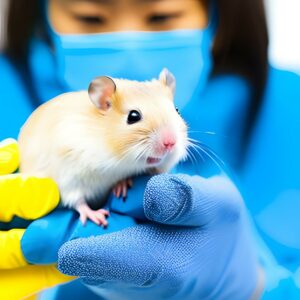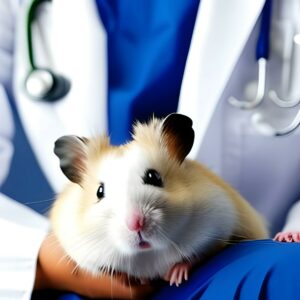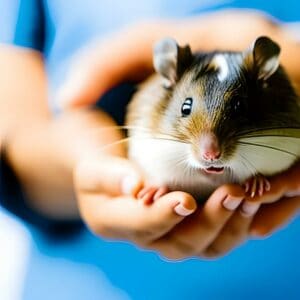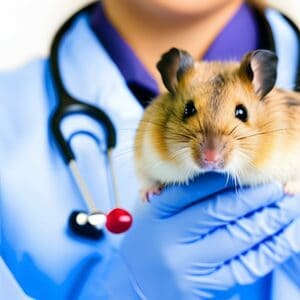As a senior hamster parent, you know that furry babies require extra care and attention as they age.
In this guide, we will discuss everything you need to know about senior hamster care, including common health problems, dietary needs, and creating a safe environment for your furry friend.
With the right care, your senior hamster can continue to live a happy and healthy life.
Let’s get to it 🙂
Senior Hamster Care: Table of Contents
Are hamsters good pets?

Hamsters are small and cute rodents native to Europe, Asia, and the Middle East.
Popular pet hamsters are:
- Syrian hamster,
- Dwarf hamster,
- Roborovski hamster.
Hamsters are typically kept in cages or tanks, which should be large enough to allow them to move around and explore. They are active animals that like to run, climb, and burrow, so plenty of toys, exercise wheels, and tunnels to play with should be a priority.
Hamsters also require bedding, such as wood shavings or paper-based materials (ex: toilet paper), to help keep their cages clean and comfortable.
Hamsters are omnivores and require a balanced diet of fresh fruits and vegetables, seeds, nuts, and protein-rich foods, such as insects or lean meats. Commercial hamster food is also available and can provide a balanced and convenient option for feeding your pet.
One of the most endearing qualities of hamsters is their playful and curious nature. They are social animals that enjoy spending time with their owners and can become quite tame with regular handling and socialization. However, it’s important to remember that hamsters are nocturnal animals, so they are most active at night and may not always be awake during the day.
Lifespan of hamsters
The lifespan of a hamster depends on the species and the care they receive.
On average, most hamsters live for about two to three years. However, some hamsters can live longer, with some dwarf hamsters living up to four years and some Syrian hamsters living up to five years or more.
The lifespan of a hamster can be affected by genetics, diet, exercise, and overall health. A healthy diet, regular exercise, and regular veterinary checkups can help to maximize your hamster’s lifespan.
Hamsters age quickly and become seniors within the first year of life. As hamsters age, they may become less active and require more specialized care to maintain their health and well-being. This can include providing softer bedding, monitoring their diet and hydration, and providing opportunities for gentle exercise and mental stimulation.
Signs of aging in hamsters
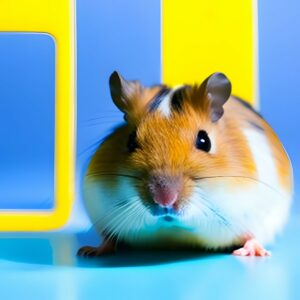
Decreased activity level: they may become less active and spend more time sleeping or resting.
Loss of muscle mass: they appear thinner or less robust.
Decreased appetite: can lead to weight loss and other health issues.
Tooth problems: overgrown teeth or tooth decay make it difficult for them to eat and drink.
Difficulty moving: arthritis and other age-related conditions can cause hamsters to experience difficulty moving and may affect their mobility.
Changes in fur color and texture: they may become thinner or grayer in color.
Decreased grooming: older hamsters may groom themselves less frequently, which can lead to a scruffy or unkempt appearance.
If you notice any of these signs of aging in your hamster, consult with a veterinarian who specializes in small animal care. They can help to assess your pet’s health and provide recommendations for specialized care to help maintain their comfort and well-being as they age.
Common health problems in a senior hamster

As hamsters age, they become more susceptible to certain health problems. Here are some of the most common health problems in senior hamsters:
Dental problems in senior hamster
Dental problems are common in hamsters, especially as they age.
These issues can range from overgrown teeth to tooth decay and can cause pain, discomfort, and difficulty eating for your pet.
Here’s what you need to know about dental problems in hamsters:
- Hamsters’ teeth grow continuously throughout their life, and if their teeth become too long, they can cause pain and may prevent them from eating properly, which can lead to weight loss and other health issues.
- Hamster’s teeth can become misaligned and develop sharp points or edges that can cause injury to their mouth or gums. If left untreated, dental problems can lead to infection, abscesses, and even death.
There are several signs that your hamster may be experiencing dental problems, including:
- decreased appetite,
- drooling,
- difficulty eating,
- weight loss,
- rubbing their face or mouth on objects,
To prevent dental problems in your hamster, provide them with a healthy diet high in fiber and low in sugar. You can give your hamster chew toys and blocks, which can help to keep their teeth filed down and prevent overgrowth.
In some cases, dental problems may require veterinary intervention, such as filing or trimming of the teeth or even extraction.
Tumors in senior hamsters
Tumors are a common health problem in senior hamsters and can be either benign or malignant. These growths can develop in different parts of the hamster’s body, including the skin, mammary glands, and internal organs.
Common tumors in senior hamsters are:
- Skin tumors: papillomas, melanomas, and basal cell tumors.
- Mammary tumors: tumors develop in the mammary glands of female hamsters, and are more common in older animals. While mammary tumors can be benign, they can also be malignant and can spread to other parts of the body.
- Adrenal tumors: are tumors that develop in the adrenal glands, which are located near the kidneys. Adrenal tumors can be either benign or malignant and can cause a range of symptoms, including weight loss and hair loss.
- Pituitary tumors: tumors that develop in the pituitary gland, which is located in the brain. Pituitary tumors can cause a range of symptoms, including changes in behavior and activity levels, as well as neurological symptoms.
- Gastrointestinal tumors: tumors that develop in the digestive system of the hamster, and can be either benign or malignant. Gastrointestinal tumors can cause a range of symptoms, including weight loss and changes in bowel habits.
Some of the signs that your senior hamster may have a tumor include:
- presence of lumps or bumps on their body,
- weight loss,
- decreased appetite,
- changes in behavior or activity levels.
- some tumors may not cause any noticeable symptoms at all.
In some cases, tumors may need to be surgically removed, while in other cases, medications or other forms of treatment may be recommended. However, it’s important to note that not all tumors are treatable, and some may progress despite treatment.
Regular check-ups with a veterinarian can help to catch any health problems early and provide your hamster with the best possible care and support as they enter their golden years.
Respiratory infections in senior hamsters
Respiratory infections in older hamsters can be caused by a variety of bacteria, viruses, or other pathogens.
Hamsters housed in dirty or overcrowded conditions are more prone to respiratory infections, as are those with weakened immune systems.
The signs of respiratory infection in a senior hamster can include:
- difficulty breathing,
- wheezing,
- sneezing,
- nasal discharge,
- lethargy,
- in severe cases, the hamster may stop eating and become dehydrated.
vets can perform a physical exam and run diagnostic tests to determine the cause of the infection and the best course of treatment.
Treatment for respiratory infections in senior hamsters typically involves a combination of antibiotics and supportive care, such as humidifying the environment to help the hamster breathe more easily.
In some cases, hospitalization may be necessary to provide intravenous fluids and other forms of supportive care.
Prevention is key when it comes to respiratory infections in senior hamsters.
Providing a clean and well-ventilated living environment, as well as a healthy diet and opportunities for exercise and mental stimulation, can help to support your hamster’s immune system and reduce the risk of infection.
Digestive problems in senior hamster

Senior hamsters can be prone to digestive problems, which can be caused by diet, age-related changes, and underlying health conditions.
Some common digestive problems in senior hamsters include:
- Diarrhea: This is a common digestive problem in senior hamsters and can be caused by bacterial infections, changes in diet, or underlying health conditions. Diarrhea can lead to dehydration, so it’s important to monitor your hamster’s fluid intake and provide access to fresh water at all times.
- Constipation: Older hamsters can become constipated due to changes in their diet or decreased mobility. Signs of constipation include straining to defecate, hard stools, and loss of appetite. Increasing fiber in the diet and encouraging exercise can help to relieve constipation.
- Tooth problems: Senior hamsters are prone to dental problems, which can cause digestive issues. If the hamster’s teeth become overgrown or misaligned, they may have difficulty chewing their food, which can lead to malnutrition and digestive problems.
- Bloat: Bloat is a condition in which the hamster’s stomach becomes distended due to gas or fluid accumulation. This can be caused by overeating, consuming high-fat or high-carbohydrate foods, or underlying health conditions. Bloat can be life-threatening if not treated promptly, so it’s important to seek veterinary care if you suspect your hamster is experiencing bloat.
To help prevent digestive problems in senior hamsters provide a healthy, balanced diet that is appropriate for their age and nutritional needs.
Encouraging exercise can also help to support their digestive health. If you suspect that your senior hamster is experiencing digestive problems, it’s important to consult with a veterinarian who specializes in small animal care to determine the underlying cause and the best course of treatment.
Arthritis in senior hamster
Arthritis is a condition that causes inflammation and degeneration of the joints, leading to pain, stiffness, and difficulty moving.
As hamsters age, their joints can begin to wear down, leading to obesity.
Some signs that your senior hamster may be experiencing arthritis include:
- difficulty moving,
- stiffness,
- reluctance to climb or play.
While there is no cure for arthritis, there are several things you can do to help your senior hamster manage the condition and maintain a good quality of life.
One of the most important steps is to keep your hamster at a healthy weight, as obesity can place additional stress on the joints. Providing a low-impact exercise routine, such as a wheel or gentle climbing opportunities, can also help to keep your hamster active and maintain joint flexibility.
Soft and supportive bedding material, such as shredded paper or cloth, can help to reduce joint pain and pressure. You can also consider providing joint-supporting supplements or medications, but it’s important to consult with a veterinarian who specializes in small animal care before starting any treatment.
With proper care and management, hamsters with arthritis can continue to live happy and active lives.
Eye problems in senior hamsters
Common eye problems that can occur in senior hamsters include:
- Cataracts: can cause the lens of the eye to become cloudy, leading to vision loss or blindness. Cataracts can be caused by aging, genetics, or underlying health conditions.
- Glaucoma: is a condition in which the pressure inside the eye becomes too high, leading to damage to the optic nerve and vision loss. Glaucoma can be caused by age-related changes or underlying health conditions.
- Conjunctivitis: is an inflammation of the lining of the eye, which can cause redness, discharge, and discomfort. Conjunctivitis can be caused by bacterial or viral infections, allergies, or other underlying health conditions.
- Tumors: can occur in the eye or surrounding tissues, leading to vision loss or other eye problems. Tumors can be benign or malignant and can be caused by genetics or underlying health conditions.
Depending on the nature of the eye problem, treatment may include medications, surgery, or other supportive measures.
To help prevent eye problems in senior hamsters, maintain a clean living environment, provide a healthy and balanced diet, and monitor your hamster’s behavior and health closely. Regular veterinary check-ups can also help to identify and address any emerging health concerns before they become more serious.
Kidney disease in senior hamster
Kidneys are responsible for filtering waste products from the blood and removing excess fluid from the body. As hamsters age, their kidneys may become less efficient at these tasks, leading to kidney disease.
Some common signs of kidney disease in senior hamsters include:
- changes in appetite,
- lethargy,
- weight loss,
- increased thirst and urination,
- hamsters with kidney disease may also experience dehydration, electrolyte imbalances, and anemia.
To diagnose kidney disease in senior hamsters, your veterinarian may perform blood and urine tests to evaluate kidney function and rule out other underlying health conditions.
Treatment for kidney disease in hamsters may include changes to the diet and living environment, such as reducing protein intake and providing access to fresh water at all times. In some cases, medications or other supportive measures may also be necessary to manage symptoms and prevent complications.
To help prevent kidney disease in senior hamsters, provide a healthy and balanced diet, avoid exposure to toxins or other environmental hazards, and monitor your hamster’s behavior and health closely. Regular veterinary check-ups can also help to identify and address any emerging health concerns before they become more serious.
How to care for senior hamster
In this piece, we will cover the two most important aspects of caring for a senior hamster.
We will focus on the environment and nutrition.
Providing a safe environment for senior hamster
To ensure that your senior hamster stays healthy and happy, it’s important to provide a safe and comfortable living environment that is tailored to their specific needs.
Here are some tips for creating a safe environment for your senior hamster:
Cage size: provide a cage that is spacious enough to allow for movement and exploration. A minimum of 450 square inches of floor space is recommended for senior hamsters.
Cage design: avoid cages with wire flooring, as this can cause foot injuries or discomfort. Instead, opt for cages with solid flooring or bedding that is soft and absorbent.
Bedding: choose a bedding material that is soft and comfortable for your hamster, such as paper or aspen shavings. Avoid bedding materials that are dusty or fragrant, as these can irritate the respiratory system of your hamster.
Food and water: provide fresh food and water for your hamster daily, and ensure that the food is appropriate for their age and health status. Hamsters may require a more specialized diet as they age, so it’s important to consult with a veterinarian for recommendations.
Exercise: encourage your senior hamster to engage in light exercises, such as walking or climbing, to help maintain their physical and mental health. Provide toys and accessories that are safe and appropriate for their age and physical abilities.
Temperature and humidity: hamsters are sensitive to changes in temperature and humidity, so it’s important to keep their living environment within a safe range. The ideal temperature range for hamsters is between 60-75 degrees Fahrenheit, and the humidity level should be kept between 40-60%.
Regular vet visits: during a veterinary check-up for a senior hamster, the veterinarian will typically perform a physical examination to assess your hamster’s overall health and look for any signs of illness or injury. They may also perform diagnostic tests, such as blood work or X-rays, to evaluate specific aspects of your hamster’s health, such as kidney function or bone density.
Some common health issues that may be addressed during a senior hamster check-up include dental problems, respiratory infections, digestive issues, and arthritis. The veterinarian may also provide recommendations for diet and exercise, as well as advice on how to create a safe and comfortable living environment for your furry friend.
Senior hamster diet
As hamsters age, their nutritional needs may change, and it’s important to adjust their diet accordingly to ensure that they receive the proper nutrients to maintain their health and well-being.
Here are some tips for providing a balanced and healthy diet for senior hamsters:
Offer a variety of foods: Senior hamsters benefit from a diet that includes a variety of foods, such as fresh fruits and vegetables, hay, and high-quality pellets. This can help to ensure that they receive a range of nutrients to support their overall health.
Here is a list of foods that are safe and healthy for senior hamsters:
Vegetables:
Broccoli
Carrots
Cucumber
Green beans
Peas
Spinach lives
Sweet potato
Zucchini
Fruits:
Apple
Banana
Blueberries
Grapes
Mango
Papaya
Pear
Strawberry
Seeds and nuts:
Flax seeds (Golden linseed)
Pumpkin seeds
Sesame seeds
Sunflower seeds
Almonds
Walnuts
Fennel seeds can be given to hamsters in small amounts as a treat, but it should not be a staple in their diet
hazel leaves – make sure they are free of any pesticides or other harmful chemicals
Other foods:
Cooked lean protein (e.g. boiled chicken or tofu)
High-quality hamster pellets
Timothy hay
Small amounts of whole grains (e.g. cooked brown rice or oatmeal)
eggs should be given to hamsters in a cooked form, such as boiled or scrambled, to avoid the risk of salmonella infection
age-appropriate food mix
barley should be given to hamsters in small amounts
Birch leaves – given in moderation
Insects – Crickets, mealworms, and waxworms
Buckwheat – is a good source of fiber, protein, and minerals like magnesium and zinc. It can be fed to hamsters in its raw or cooked form.
Amaranth – is a good source of protein, fiber, and minerals like calcium and iron. It can be fed to hamsters in its raw or cooked form.
Parsnip – Parsnip is a root vegetable that is high in fiber, vitamins, and minerals like potassium and manganese. It can be fed to hamsters in its raw or cooked form.
Beetroot – Beetroot is a good source of fiber, vitamins, and minerals like folate and iron. It can be fed to hamsters in its raw or cooked form, but should be given in moderation due to its high sugar content.
Parsley leaves – are a flavorful herb that is rich in vitamins and minerals like vitamin C and potassium. It can be fed to hamsters in its raw or cooked form.
Oat flakes – are a good source of fiber and protein, and are easy for hamsters to digest. They can be fed to hamsters in their raw or cooked form.
Corn flakes – are not recommended as a regular part of a hamster’s diet. While they are not necessarily harmful, they are not nutritionally beneficial either. Corn flakes are high in carbohydrates and sugar, which can lead to weight gain and dental problems in hamsters. Additionally, they do not provide the necessary vitamins, minerals, and protein that hamsters need for optimal health. It is best to stick to a diet of high-quality seeds, fresh vegetables and fruits, and occasional protein sources for your hamster.
When feeding your senior hamster fruits and vegetables, it is important to cut them into small pieces and remove any seeds or pits to prevent choking. Additionally, only give small portions at a time to avoid digestive issues.
Some foods should be avoided when feeding your senior hamster, such as citrus fruits, grapes with seeds, onions, garlic, chocolate, and any processed or sugary foods. These foods can be harmful to hamsters and may cause digestive upset or other health issues.
As always, it’s best to consult with your veterinarian to determine the best diet for your senior hamster based on their individual needs and health status.
Monitor portion sizes: older hamsters may become less active and require fewer calories. It’s important to monitor the amount of food to avoid overfeeding, which can lead to weight gain and other health problems.
Provide plenty of water: senior hamsters require access to clean, fresh water at all times. Make sure to provide a water bottle or bowl that is easily accessible to your hamster.
Choose soft foods: hamsters may have difficulty chewing hard foods. Consider offering soft foods, such as cooked vegetables or soft pellets, to make it easier for them to eat.
Avoid sugary or high-fat foods: senior hamsters are more susceptible to health problems such as diabetes and obesity, so it’s important to avoid offering sugary or high-fat foods that can contribute to these conditions.
Offer supplements as needed: depending on your hamster’s individual health needs, your veterinarian may recommend supplements such as vitamins or probiotics to support their health.
Vitamin A: This vitamin is important for vision, immune function, and healthy skin and fur. Good sources of vitamin A for hamsters include carrots, sweet potatoes, and leafy greens.
Vitamin D: This vitamin helps with calcium absorption, which is important for bone health. Hamsters can produce their own vitamin D when exposed to sunlight, but it can also be found in fortified foods or supplements.
Vitamin E: This vitamin has antioxidant properties that can help protect cells from damage. Good sources of vitamin E for hamsters include nuts, seeds, and leafy greens.
Calcium: This mineral is essential for bone and teeth health. Calcium can be found in dairy products, leafy greens, and fortified foods.
Phosphorus: This mineral is important for bone health and energy production. Phosphorus can be found in meat, dairy, and legumes.
Iron: This mineral is important for oxygen transport in the body. Iron can be found in meat, fish, and leafy greens.
Vitamin C: Hamsters require vitamin C in their diet, as they cannot produce it on their own. This vitamin is important for immune function, collagen production, and skin health. Good sources of vitamin C for hamsters include citrus fruits, berries, and leafy greens.
Zinc: This mineral is important for immune function and wound healing. Zinc can be found in meat, dairy, and legumes.
Potassium: This mineral is important for nerve and muscle function, as well as maintaining healthy blood pressure. Potassium can be found in bananas, potatoes, and leafy greens.
Magnesium: This mineral is important for bone health and energy production. Magnesium can be found in nuts, seeds, and leafy greens.
Copper is not considered an essential nutrient for hamsters, and in fact, excessive amounts of copper can be toxic to them. Therefore, it’s important to avoid giving your hamster foods that are high in copper, such as liver, shellfish, and some types of nuts.
Hamsters require small amounts of manganese in their diet, but it is not considered an essential nutrient. Manganese can be found in a variety of foods, including whole grains, nuts, seeds, and leafy greens. However, as with all minerals, it’s important not to provide excessive amounts of manganese to your hamster, as this can lead to toxicity.
Hamster FAQ
Lifespan: The average lifespan of a hamster is around 2-3 years, although some species can live up to 4 years.
Size: Hamsters typically weigh between 20 and 150 grams, depending on the species. The Syrian hamster is the largest species, while the dwarf hamster is the smallest.
Dental issues: According to a study published in the Journal of Exotic Pet Medicine, dental problems are the most common health issue in pet hamsters, with up to 50% of all hamsters experiencing some form of dental disease.
Tumors: Another study published in the Journal of Exotic Pet Medicine found that tumors are the second most common health issue in pet hamsters, accounting for 20% of all cases.
Respiratory infections: Respiratory infections are also common in hamsters, particularly in older animals. A study published in the Journal of Small Animal Practice found that up to 20% of all pet hamsters may be affected by respiratory infections.
Nutritional requirements: Hamsters require a diet that is high in fiber, protein, and certain vitamins and minerals. According to the National Research Council, adult hamsters require a diet that is 16-20% protein and 4-5% fat and should be supplemented with fresh fruits and vegetables.
Behavior: Hamsters are social animals that thrive in pairs or small groups. However, they may become aggressive towards each other if not introduced properly and should be supervised when interacting with other animals or humans.
My Senior Paws is a participant in the Amazon Services LLC Associates Program, an affiliate advertising program designed to provide a means for sites to earn advertising fees by advertising and linking to Amazon.com. We also participate in other affiliate programs which compensate us for referring traffic.
